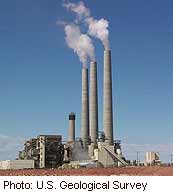- 10 Strategies to Overcome Insomnia
- Could Artificial Sweeteners Be Aging the Brain Faster?
- Techniques for Soothing Your Nervous System
- Does the Water in Your House Smell Funny? Here’s Why
- Can a Daily Dose of Apple Cider Vinegar Actually Aid Weight Loss?
- 6 Health Beverages That Can Actually Spike Your Blood Sugar
- Treatment Options for Social Anxiety Disorder
- Understanding the Connection Between Anxiety and Depression
- How Daily Prunes Can Influence Cholesterol and Inflammation
- When to Take B12 for Better Absorption and Energy
Coal Ash Contains High Levels of Radioactivity: Study


Coal ash contains levels of radioactivity that raise concern about the environment and human health, researchers warn.
Scientists from Duke University in Durham, N.C., analyzed coal ash from all three major coal-producing basins in the United States and found levels of radioactivity that were up to five times higher than in normal soil, and up to 10 times higher than in unburned coal.
Combustion concentrates radioactivity, the researchers explained.
Coal and coal ash from the Illinois basin had the highest levels of radioactivity, followed by the Appalachian basin and the Powder River basin in Montana and Wyoming.
The study was published recently in the journal Environmental Science & Technology.
Currently, coal ash is unregulated in the United States and is stored in coal-fired plants’ holding ponds and landfills. The Environmental Protection Agency’s first-ever regulations on coal ash disposal are set to begin in October, the researchers said.
“Until now, metals and contaminants such as selenium and arsenic have been the major known contaminants of concern in coal ash,” said study co-author Avner Vengosh in a university news release.
“This study raises the possibility we should also be looking for radioactive elements,” said Vengosh, who is a professor of geochemistry and water quality at Duke’s Nicholas School of the Environment.
More information
The U.S. Environmental Protection Agency has more about coal ash.
Source: HealthDay
Copyright © 2026 HealthDay. All rights reserved.










